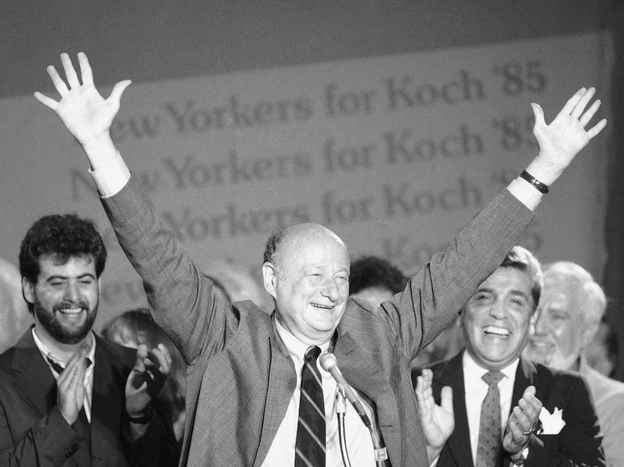The clock says to get moving but I can't. I screw my delicate mousetrap mouth to one side and show my brass stare. Not for nothing I call myself an iceberg. The people I hate are just outside my window.
I want to yell at them, to curse them out. I want to drop marshmallows and watch them splatter with lethal force after the 37 floor Times Square freefall.
But the windows don't open. I'm stuck in this sepulcher, this white man's palace. I sit back and let the phone ring. Voice mail is a very underrated thing.
It's that time of month. That's what my boss says.
He's sure it's that and not impending skin cancer. Or that my tanning lamp burned out. Or that I was badly clawed on my leg by my neighbor's cat which I was taking care of while she was in Bermuda. Or because my favorite neon tetra has been floating upside down near the surface of the fish tank for three days now.
No.
My boss says it's that time of month. That's why he's my boss and not the other way around--because he's a simple charlatan who knows nothing but trusts his gut.
“Call Red Adair,” I tell him. “The oil well's on fire.”
He doesn't say, “Take the day off.”
He says, “What? Like your shit doesn't stink too.”
And I want to shout. Of course it does, you silly man. It stinks on hot ice. You're the one pretending to be perfect, with your Armani suits and your slicked back hair and your immaculate clear polished fingernails. You're the one who thinks he's better than everyone else. You. You, Mister Sexy, you.
But I don't say a word.
Because what angers me is that he's right--it is that time of month. It wasn't supposed to be--not for another eight days according to my regular schedule, which has run like clockwork for two years now--but when one thing goes wrong everything does. The whole damn system breaks down. And then the blood starts flowing. The crowning insult: I'm the Bayonne bleeder. Get me the vacuum cleaner, please.
“Only women bleed,” I tell Eric when I get home.
Of course he has a comeback.
“How about my hemorrhoids?”
And I'm forced to tell him that I don't want to think about his hemorrhoids because that's an everyday thing and asking someone, even your partner, to think about something like that every day is tyranny, is fascism, is oppression, whereas the period, the menses, the brown blood flow, is only once a month and asking someone to be a little considerate once a month is reasonable. Indeed, it's what you should expect of friends. Time to vacuum, Dickhead.
He doesn't say: “I understand. Let me cook you dinner.” Or even: “Can I help you clean?”
He says, “Get the fuck out of my face.”
Which he considers the height of rational discourse.
Sometimes the dude is like a brick wall. There's more responsiveness in a piece of raw meat.
I, on the other hand, am a sponge. Everything leaks because everything in this faulty world must at some point or another lose fluid, it's an unwritten law, and I soak it all up. A blood sandwich. When I was a kid that's what I'd do when we ate meat. Take a piece of white bread--Wonder or Arnold work best--lie it in the juice, and when it was full, soaked to the max, I'd fold it up between my fingers and eat the succulent morsel in one bite. Then I'd lick the running red stuff off my fingers. It was better than Bosco.
When I'm like this, Eric goes to Pittsburgh. Which is to say he doesn't call, doesn't propose a candlelight dinner, doesn't wait for me to call him. He simply digs out his tools and spends his days working with a blowtorch, sweating pipe. Ordinarily he's a graphic artist. When I'm on the rag he's a plumber.
I know he'd like to take that torch to me. A BernzOmatic straight to my borscht belt. He doesn't realize that what I need right now, when I'm groaning and vacuuming and he's monkeying with a hot water heater, is a good roll, a quality lay, a frenzy of fingers all over me. A back rub is not enough. Show me one woman who hasn't at these moments found an excuse to take a hot bath so she could get off on the jetting water flow while her queasy mate sat silently on the bed watching The Price is Right, intimidated by the sheer, unavoidable, natural physicalness of her body. Nice girls do, all the time.
We are, after all, tied to the forces that move the moon and the stars. We are cosmological.
Unfortunately, though, that mystical connection doesn't make it any easier. The philosophers say that with repetition a thing becomes familiar, a part of you. But if more of these western philosophers were women, the whole damn corpus would be different. Kierkegaard and his ilk could hardly deal with the opposite sex. We were the other, the dreaded, the unknowable. “Supposing truth is a woman what then,” wrote Nietzsche. The truth he couldn't handle. A thing beyond good and evil. A bloody thing.
The first time I sent Eric out for tampons, he bought Pampers instead. He said he didn't notice the picture of the baby on the box.
“You don't know anything,” I told him.
He gets rational when he gets angry. He corrected my grammar. “Use proper English,” he said, “The right way to say it is, 'You don't know shit.'” Then he left. That was the start of his monthly disappearances.
It actually didn't matter that he was too embarrassed to buy me my OB's. I used the Pampers anyway. I rolled up one of the diapers and stuffed it in my underwear like a maxi-pad. Talk about roughing it.
Eric doesn't notice much. When I'm pre menstrual I stand in front of the mirror each morning and weigh my breasts, one in each hand. They're so heavy, almost painfully droopy. They scare me. But he has never remarked on it.
He doesn't see the pimple on my forehead or my shoulder that even now, at age 36, comes every month to presage the period.
He remains male, doggedly outside and oblivious. He never breaks out, never gains weight, always wears comfortable clothes, and thinks he looks good without a shirt. So much for justice.
When I have a particularly bloody and painful period, when Eric has disappeared and I'm alone, this is what I do: I save my tampons. I dry them out, let the blood turn brown. Then I send postcards. Each one has a tampon stapled to it by the string.
I call them my monthlies. I send them to certain men I know. I inscribe different sayings on the cards. I have written: “Run for your life. It's a gusher.” I have written, “Warning: If used improperly this device can cause grievous bodily injury.” I have written, “This plug's for you.”
I imagine mailmen throughout the country delivering these missives, holding them gently by the edges so as not to be contaminated. I envision the people who sort the mail refusing to touch my monthlies without rubber gloves.
I have only had one bad reaction--from my sister. She told me my brother in law thought I was being aggressive.
My brother in law's a good man. But I know that aggressive isn't in his vocabulary.
“Was that his word?” I asked.
“No,” she admitted. “What he really said was, 'I like your sister, but she sure can be a ballbuster.'“
I wanted to shout. Of course. I am a ballbuster. Absitively. Posolutely. But only because I've had my balls busted so often myself. Why can men give but not receive? Just what is the deal here?
But I didn't say anything. Sisterhood is powerful, but not that powerful. There is no such thing as solidarity.
When I was a kid, there were icebergs in the Hudson. I saw them from the Jersey side every time we drove over the G.W. Bridge, and I swear my father told me that his father had walked across the river when he was young, because it used to freeze solid. But there are no icebergs anymore. Even in last year's cold snap, the river didn't freeze.
Since I'm almost done with the flow, Eric consents to meet in a bar after work. Eighth Avenue. The neons stain the faces of the people en route to the Port Authority. I stand in the doorway. This is an old men's place. They're watching Jeopardy. The 7 p.m. ritual. I don't find this at all threatening. Guys like getting the answers and trying to guess the questions. Women like giving the answers and not worrying about the questions. We have formalized this in our culture. We call it marriage. We call it relationship. We call it the war between men and women. Jeopardy, in a larger sense.
“What is Kashmir,” the toothless guy at the head of the bar shouts, and everyone nods.
Eric is wearing his Mister Sexy shirt, the one he always leaves unbuttoned one button too far, to show off his chest hair. He's watching TV too.
“What is Macedonia,” Eric shouts. Countries for $200.
He's put himself in this line up. The male fashion show. Guys in jean jackets with hair a la mode thinning but pulled back into a pony tail drinking beer and calling out their responses to an insane TV quiz show, bonding without talking about anything at all.
And I realize that's the point. Eric wants me to choose him. To supply the question to his answer each time: do I recognize him, do I think he's sexy, do I love him.
What would he do if I walked up to some other guy the greasy guy with the paunch sitting next to him, for instance and gave him a tongue kiss? What would he do if I sucked on the guy's neck, Dracula style, and ran my fingers through his hair?
But, of course, I don't do any of that.
This is what I do: I walk up to Eric, down the remainder of his pint beer, and before he can say his usual, casual, super cool, “Hey, babe,” I say, so loud it projects beyond Jeopardy and for all I know beyond the bar and out into the street, “Up your fucking ass, Mister Sexy.”
As I slide onto the stool on the other side of Eric from the fat guy, I'm electric. Eric notices who couldn't and doesn't say anything. His pulse chimes the seconds in his neck. I'm glowing. My nails are redder than the coating on a candy apple. My jacket, and my bustier underneath it, are ruddier than a fresh piece of meat. My lips and cheeks are rosier than a blushing bride. My proud flesh is phosphorescent.
“Sometimes you are so rotten,” Eric finally splutters, and unwittingly speaks the words of the ages. For I am rotten. Women always have been. I curdle cream. I sour milk. I make good meat turn bad. I am the spoiler, the carrier of rot and fermentation and degradation. And yet, at the same time, I am the red cross, the fertile crescent, the cradle of civilization.
I just sit there, and Eric disappears and the whole bar disappears. I am brighter than the neons and darker than the moon, hotter than strong acid and colder than any iceberg.
“What is bleeding,” I shout. In the distance, everyone applauds. It's the right answer to the Daily Double and I win a bourbon and a beer.




.jpg)



